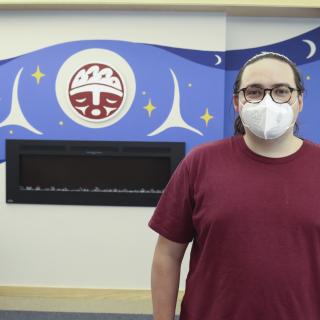“There is no other, the other is only ever us,” is the underlying theme in Kim Samuel’s work about connectedness and acknowledging humanity and our entitlement to be treated with love and respect.
Kim Samuel, Founder of the Samuel Centre for Social Connectedness (SCSC), is unwavering in her advocacy for human rights and inclusive policy change. Her life’s work has focused on the power of social connectedness to build community and overcome social isolation on a local and global scale.
Samuel’s undertakings and contributions toward overcoming isolation to improve lives is being recognized by Vancouver Island University (VIU) at the afternoon Convocation ceremony on February 1, 2019, where she will be awarded an Honorary Doctor of Letters.
The issue of social isolation first appeared to Samuel in 1997, when her father suffered a sudden brain injury. She came to understand social isolation, which accompanied her father’s recovery, as the feeling of sitting alone at the bottom of the well. She also witnessed how he continued to show resilience and strength in overcoming his isolation.
“If you are socially isolated, you feel like you don’t belong, you feel like you are less than,” says Samuel. “You can feel as though you are an ‘other.’ We marginalize people who are different than ourselves and label them as others. But it is not because of their diversity or uniqueness, it is because some part of society judges them somehow being less than human.”
Another seminal moment for Samuel was when she met Nelson Mandela in 2002, who described to her how he never felt isolated while imprisoned on Robben Island during the fight against Apartheid in South Africa, because they were all brothers working together with a common purpose. He was never alone. For Samuel that was the beginning of a profound shift in her observations about the power of community in transcending isolation.
Samuel’s work examines how issues such as class, gender, race and environmental destruction can isolate people and communities. “We see more than ever that the people living in marginalized communities around the world have a lower capacity to prepare for and cope with extreme weather and climate-related events, furthering their risk of exacerbated isolation,” she says.
She has also worked on measurable components of multi-dimensional poverty which underscores the importance of social connectedness to upholding human dignity and human rights globally.
In 2014 and 2016, Samuel convened the Global Symposium on Overcoming Isolation and Deepening Social Connectedness, bringing together more than 100 thought leaders to collaborate and build pathways to belonging. The next Global Symposium will take place in October 2019.
Samuel is a Professor of Practice at the Institute for the Study of International Development (ISID) at McGill University. In 2016, Kim designed and delivered the first academic course in the emerging field of social connectedness and taught another cohort in 2017.
That opportunity was another pivotal moment in her life’s work. “When I went to McGill, I planned to deliver this course and design it so it could be taught at any university in the world, but I didn’t expect that I would absolutely fall in love with teaching.”
In 2017, she launched the Social Connectedness Fellowship program, which offers recent graduates the opportunity to carry out research related to social isolation and connectedness.
The Samuel Centre for Social Connectedness, a non-profit organization she established in 2018, works with partners around the world to overcome social isolation and build belonging through research, programming and learning initiatives.
“Ms. Samuel, more than anyone, understands the powerful and impactful role that education plays as a driver of social progress and economic prosperity,” says Robin McLay, VIU Senior Advisor to the President.
-30-
MEDIA CONTACT:
Annette Lucas, Communications Officer, Vancouver Island University
O: 250.741.2020 | C: 250.618.7296 | E: Communications@viu.ca


